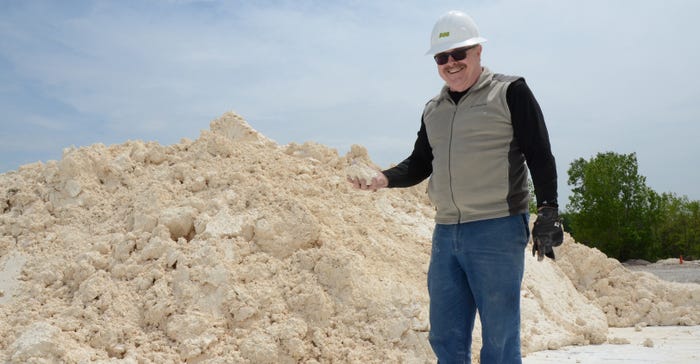
Editor’s Note: This is part of a series of articles featuring recipients of the Food and Agriculture Investment Program.
Substantial agribusiness investments have been made all over Michigan in recent years, including a cheese plant in St. Johns, a pork processing plant in Coldwater, a potash mine and processing facility in Evart, and a new soybean processing facility in Ithaca — to name a few.
Added to the list, Prolime Agriculture LLC went online in January at its Shiawassee County manufacturing plant producing pelletized lime. Including the property, facility and equipment, it represents close to a $10 million investment. The company will produce about 20,000 tons this year, but expects to increase that up to the full production of 60,000 tons annually.
Traditionally, lime has been broadcast applied. By offering lime in pellets, it can be precision applied. “Producers are so precise now, they want to be able to meter pounds per acre instead of tons per acre,” says Bob Rogers, president of Prolime. “By having a pellet, they can better control the variable rates of application.”
As an input, farmers use lime to adjust the pH levels in soils. “When the pH is correct in the soil,” Rogers adds, “herbicides, fertilizers and pesticides work better, which means you can use less of all of those to do the job right, which can improve yields.”
The product is more expensive than traditional lime. Rogers says that producers will find the value in being able to precision apply, resulting in other input savings and a bump in yield.
According to a study by Cornell University, improving pH from a level of 5 to 6 reduces fertilizer waste from 54% to 20%.
Another study done by Purdue University showed improving field pH with lime helped increase soybean yields by 12 bushels per acre.
The company also offers pelletized gypsum that supplies sulfur, which has reportedly become increasingly deficient in farmland. “It also increases the tilth of the soil,” Rogers says.
To aid in construction, Prolime Agriculture LLC was a recipient of a $50,000 Food and Agriculture Investment Fund Performance grant, administered through the Michigan Department of Agriculture and Rural Development.
Prolime’s 56,000-square-foot facility in Laingsburg is just off the I-69 corridor, allowing for easy access to many of the state’s thoroughfares. Product is delivered to input dealers across the state and into other Midwest states. It’s currently offered in bulk, but Rogers says the next phase of the business will add a bagging operation. “We see a market for bagged product, particularly in Canada and in stores like Walmart and Home Depot,” he says.
By offering a Michigan-based source of pelletized lime and gypsum, Michigan farmers stand to save considerably on freight costs, Rogers points out. Currently, shipping product from the nearest production facility in Ohio to Lansing, Mich., costs about $23 a ton. When Prolime reaches its full capacity of 60,000 tons annually, it could represent a savings of more than $1 million annually in freight costs.
Opportunity calls
While working for his father’s excavating company, Rogers got a call in 1986 from the city of Owosso, which, like other municipalities, uses lime for the treatment of freshwater. Rogers explains that the city crushes lime and uses it to cause an ion exchange to remove hardness from the water. Once it is used, it lies in the bottom of the water plant. This spent lime is then pumped to lagoons.
“They called me because I was doing some environmental work at the time,” Rogers says. “The spent product is wet and a bit slimy, like Crisco. I consulted with Michigan State University and found out it was an excellent lime material for cropland.”
Prolime was formed in 1987. Rogers bought a spreader and learned how to load, haul and handle the product. He now sources the lime from several municipalities in the Midwest and Florida.
“The spent lime typically has a higher neutralizing value than regular limestone,” Rogers says. “It’s a high-calcium lime. It’s ground finer, so it acts quicker than conventional ag lime, which consists of small rocks. This product is so fine, it dissolves immediately.”
The product is offered in bulk from input dealers.
Construction of the new manufacturing facility to provide pelletized product started in March 2018 — the same time the Michigan Commission of Agriculture and Rural Development approved the $50,000 grant. Rogers credits Justin Horvath with the Shiawassee County Economic Development Partnership for introducing him to the grant opportunity and for championing his business and others in the county.
The grant money was used to fund a 16,800-square-foot slab where the wet product is laid out to dry and condition.
“We aerate, stir and move it with loaders and specialized equipment,” Rogers says. “We could use another 5 acres of hard surface, but we were thrilled to receive the funding that was provided.”
Lime conditioning continues inside the plant. Then a series of conveyers moves the product, a liquid binding agent is added to start the pelletizing process, a pan granulator rotates it to size where it is then discharged to be dried. It is a closed-loop system where the entire off-spec product is reintroduced back into the process.
The plant is operating with seven employees, but as production ramps up to two shifts, Rogers says it will probably have 12 to 15 people working in the plant with another three or four working outside conditioning.
“The goal is to be the go-to place for quality, local pelletized lime and gypsum and to provide the best value that we possibly can,” he says. “We’ve taken product the state of Michigan has been concerned about for many years and turned it into a beneficial product for agriculture.”
About the Author(s)
You May Also Like






